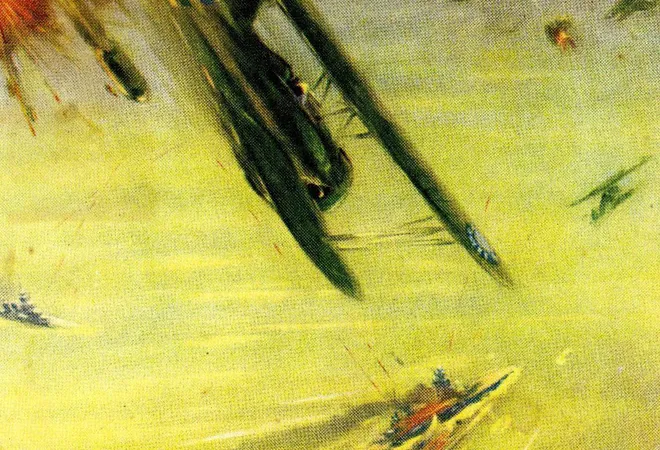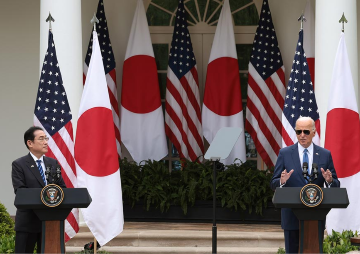
This is the eleventh part in the series The China Chronicles.
Read all the articles here.
No other country in recent history has so systematically pursued its national objectives as China. Its single-minded pursuit of grand strategic objectives invokes respect even among analysts not usually predisposed to optimism about China's strategic intent. In particular, Deng Xiaoping's public call in 1984 to quadruple Chinese GDP by the end of the twentieth century — and meeting the target ahead of time — is often taken to be a leading exhibit of the single-minded devotion of national resources to meet Chinese core objectives. Similarly, when Xi Jinping talks about his vision of China's "Two Centuries," — 2021, the establishment of the CPC, and 2049, the creation of the PRC — analysts read Chinese resoluteness.
But grand strategy is more than just setting national goals and meeting them by deploying adequate resources. It is, as diplomatic historian Hal Brands put in a recent book, an act of matching power and purpose. Grand strategy is, as Brands writes, "the intellectual architecture that gives form and structure to foreign policy." It is in this sense that detailed analysis of China's grand strategy by Chinese authorities in English (as opposed to western experts) are hard to come by. Two works stand out in being exceptions to this rule. The first one is a 2003 book by Peking University professor Ye Zicheng, translated to English in 2011. The second is a 2011 article by another professor from the same university, Wang Jisi. Both works are remarkably candid about China's vision of its role in the world.
Ye Zicheng describes China's core grand-strategic goal as becoming a "world power" through "peaceful development." Economic development will be, for Ye, what makes China a world power. On the face of it, this is innocuous enough. After all, almost every emerging state would aspire to be one, preferably through non-conflictual means of strengthening its economy. But the interesting thing about Ye's characterisation is that, in his typology, there are two other kinds of powers: a "global superpower" and a "super power." An international system with a "global superpower" would be, by definition, unipolar; a world of "superpowers" bipolar. Ye therefore makes China's preference for a multipolar world of "world powers" known. He writes (of the Russia-China relationship): "The rise of only China or only Russia would not lead to a stable multipolar world ." Indeed for Ye, the mutual quest for mutipolarisation is what results in both Russia and China pursuing cooperation over competition. Ye also points to the need for China and India to manage their differences in order to establish a "multipolar world."
Ye also points to a pervasive theme in the writings of other Chinese experts (inside the PLA and elsewhere) that "China pursue a national defence policy that calls for the construction of national defence to serve overall economic development." This is consistent with Chinese pursuit of dual-use technology and the possibility of military Keynesianism 'with Chinese characteristics.' But there is another subtle point in Ye's argument which he spells out. If China was to arm itself to the point that the hegemon is worried, that may imperil China’s sustained economic growth through the possibility of war — a security dilemma. By emphasising economic development priorities over national defence ones, China is willing to seek "relative" as opposed to "absolute" security, Ye contends.
But Ye is no dove, seeking the cause of world peace alone. The most striking parts of his book are his descriptions of the vulnerabilities of the United States even in face of "their overwhelming power enables them to pursue and achieve absolute security." Ye reminds the readers of the story of David and Goliath and notes: "The United States is so strong that none of its enemies will confront it directly. Rather, they will adopt asymmetrical methods to oppose it." In a way that should give pause American policy-makers, Ye lists, "nuclear power plants, electronic communications centres, and hydroelectric power plants," as additional examples of American vulnerabilities. In fact, in 1999 two PLA colonels had written a book on what they termed "unrestricted warfare" — a menu of asymmetric means, including terrorist attacks, to defeat the United States in event of a conflict.
The David-Goliath story also finds a re-expression in the works of another PLA colonel and National Defence University scholar Liu Mingfu who wrote a 2009 book called the China Dream. Liu has described the competition between the US and China as a marathon of endurance — sustained by dollops of cunning — in contrast to a duel or boxing match between equals. And Liu is not on the fringe. For example, many analysts (most notably, former American intelligence official Michael Pillsbury) have speculated that when Xi Jinping talks about the "Chinese Dream," he is taking a cue from Liu. But the crucial difference between Liu and Ye is that Liu’s grand-strategic goal is China emerging as a worldwide hegemon by 2049 (the end of the "Hundred-Year Marathon") after deposing the United States from that position. Ye, on the other hand, wants a multipolar world that keeps American power and unilateralism in check in tandem with other powers.
Peking University professor Wang Jisi's 2011 Foreign Affairs article is on every reading list on China’s grand strategy. It is also striking in the length it goes to suggest "it is almost impossible to devise a straightforward organising principle for Chinese foreign policy" — a grand strategy for China, in other words. But that economic growth will remain the key objective of Chinese strategy is clear through Wang's remarks. He notes the 2006 CPC Central Committee announcement that China's foreign policy "must maintain economic construction as its centrepiece, be closely integrated into domestic work, and be advanced by coordinating domestic and international situations." More broadly, Wang notes three core interests of the People's Republic according to a former state councillor for external relations: political stability, in that the CPC leadership is perpetuated; "sovereign security, territorial integrity and national unification”; and economic development and growth that can be sustained over the long run. Wang does note that these “three prongs, which are sometimes in tension," is the reason why China may be forced not to have a coherent grand strategy.
Without calling it as such, Wang is alluding to China's persistent grand-strategic trilemma. If China was to choose economic growth and sovereign security, it may have to crackdown on dissidents that could (unintentionally, perhaps) imperil the latter, much like the 1989 Tiananmen Square episode. That, in turn, could ultimately lead to the collapse of the CPC rule. If China was to choose political stability and assert its strong sovereignty posture (including more assertive claims toward Taiwan, for example), it would possibly lose access western capital and technology needed for its sustained economic growth. Finally, if China was to choose continued CPC rule as well as sustained economic growth, it will have to keep its larger geostrategic goals — including reunification with Taiwan — in check, for that could imperil both.
Until now it is evident that China's grand-strategic priorities are titled towards the continued economic growth of China under CPC watch — and thus keeping its geopolitical ambitions (such as favourable resolutions of its border disputes) under rein. But recent Chinese assertiveness suggests that China's grand-strategic trilemma may be a chimera after all. In any case, by the time the second of Xi's "Two Centuries" — the hundred anniversary of communist China — rolls around, Chinese economic, military, and diplomatic might put together will lead to a situation where this trilemma no longer applies.
The views expressed above belong to the author(s). ORF research and analyses now available on Telegram! Click here to access our curated content — blogs, longforms and interviews.




 PREV
PREV



